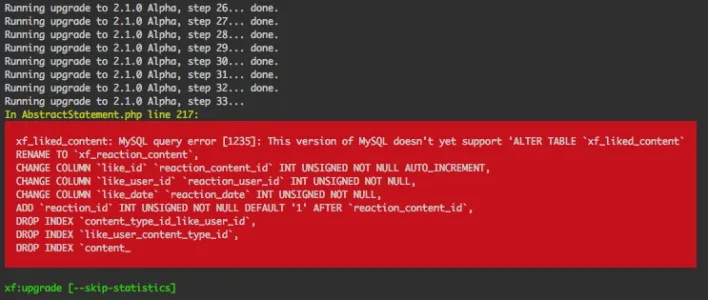digitalpoint
Well-known member
- Affected version
- 2.1.0
Not a huge deal because I already worked through it, but might save you guys a support issue down the road. While the SQL query build is fancy and big, not all storage engines support multiple commands in a single SQL statement.

From the Limitations of NDB online operations section here: https://dev.mysql.com/doc/refman/8.0/en/mysql-cluster-online-operations.html
Not as clean, but at least it works... I just made each function their own SQL statement in step 33, and goes through without any issues.

From the Limitations of NDB online operations section here: https://dev.mysql.com/doc/refman/8.0/en/mysql-cluster-online-operations.html
MySQL 8.0 Documentation said:A given online ALTER TABLE can use only one of ADD COLUMN, ADD INDEX, or DROP INDEX. One or more columns can be added online in a single statement; only one index may be created or dropped online in a single statement.
Not as clean, but at least it works... I just made each function their own SQL statement in step 33, and goes through without any issues.
PHP:
public function step33()
{
if (!$this->schemaManager()->tableExists('xf_liked_content'))
{
// if this table doesn't exist, then this query has been run already, so we can skip it.
return;
}
$this->alterTable('xf_liked_content', function (Alter $table) {
$table->renameTo('xf_reaction_content');
});
$this->alterTable('xf_reaction_content', function (Alter $table) {
$table->renameColumn('like_id', 'reaction_content_id');
});
$this->alterTable('xf_reaction_content', function (Alter $table) {
$table->addColumn('reaction_id', 'int')->setDefault(1)->after('reaction_content_id');
});
$this->alterTable('xf_reaction_content', function (Alter $table) {
$table->renameColumn('like_user_id', 'reaction_user_id');
});
$this->alterTable('xf_reaction_content', function (Alter $table) {
$table->renameColumn('like_date', 'reaction_date');
});
$this->alterTable('xf_reaction_content', function (Alter $table) {
$table->dropIndexes('content_type_id_like_user_id');
});
$this->alterTable('xf_reaction_content', function (Alter $table) {
$table->dropIndexes('like_user_content_type_id');
});
$this->alterTable('xf_reaction_content', function (Alter $table) {
$table->dropIndexes('content_user_id_like_date');
});
$this->alterTable('xf_reaction_content', function (Alter $table) {
$table->dropIndexes('like_date');
});
$this->alterTable('xf_reaction_content', function (Alter $table) {
$table->addUniqueKey(['content_type', 'content_id', 'reaction_user_id'], 'content_type_id_user_id');
});
$this->alterTable('xf_reaction_content', function (Alter $table) {
$table->addKey(['content_type', 'content_id', 'reaction_date'], 'content_type_id_reaction_date');
});
$this->alterTable('xf_reaction_content', function (Alter $table) {
$table->addKey(['content_user_id', 'reaction_date']);
});
$this->alterTable('xf_reaction_content', function (Alter $table) {
$table->addKey('reaction_date');
});
}